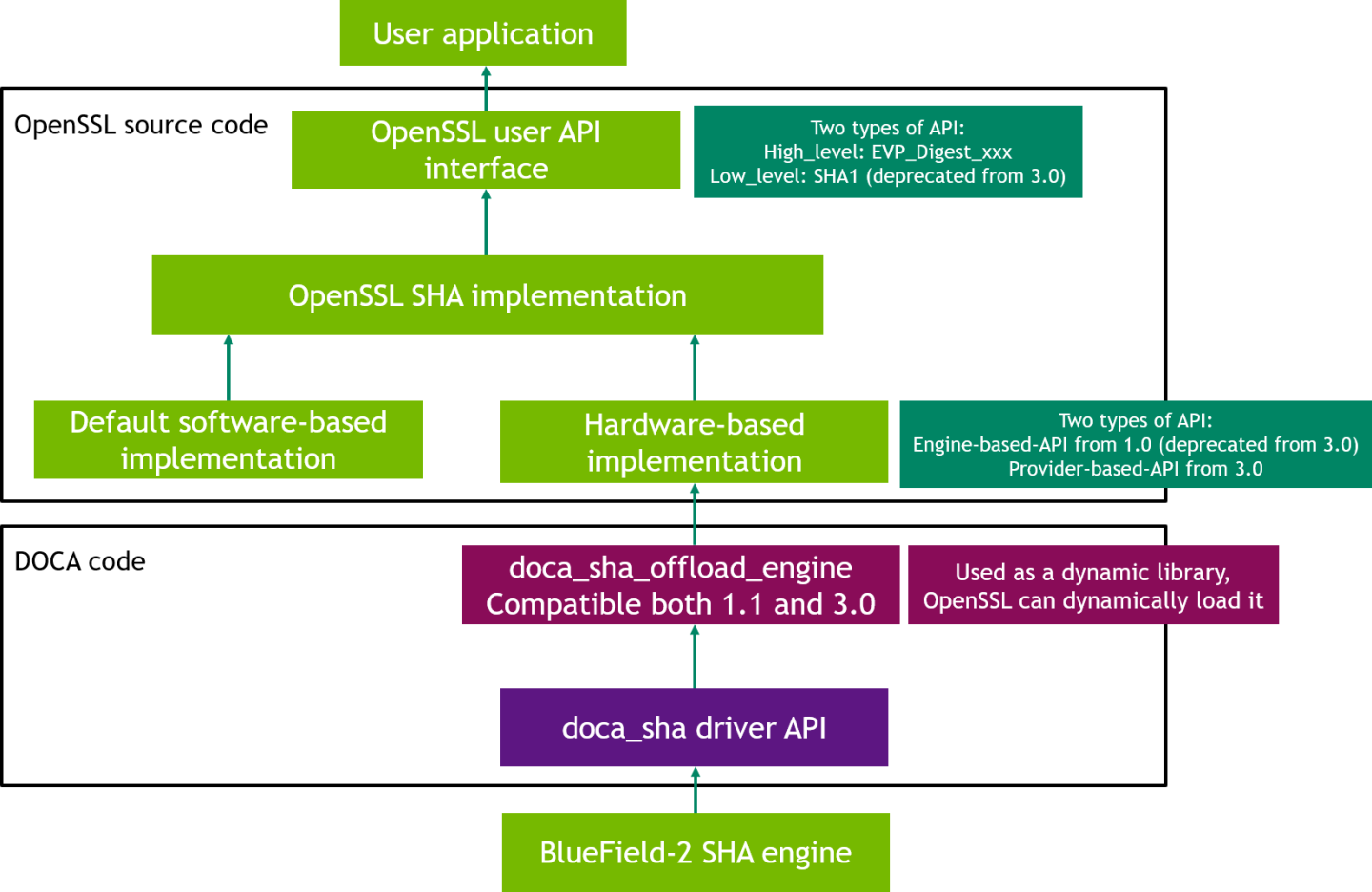NVIDIA DOCA with OpenSSL
This guide provides instructions on using DOCA SHA for OpenSSL implementations.
The doca_sha_offload_engine is an OpenSSL dynamic engine with the ability of offloading SHA calculation. It can offload the OpenSSL one-shot SHA-1, SHA-256, and SHA-512. It supports synchronous mode and asynchronous mode by leveraging the OpenSSL async_jobs library. For more information on the async_jobs library, please refer to official OpenSSL documentation.
This engine is based on the doca_sha library and the OpenSSL dynamic engine interface API. For more information on the OpenSSL dynamic engine, please refer to official OpenSSL documentation.
This engine can be called by an OpenSSL application through the OpenSSL high-level algorithm call interface, EVP_Digest. For more information on the EVP_Digest, please refer to official OpenSSL documentation.
Hardware-based doca_sha engine which can be verified by calling doca_sha_get_hardware_supported()
Installed OpenSSL version ≥ 1.1.1
The following diagram shows the software hierarchy of doca_sha_offload_engine and its location in the whole DOCA repository.
From the perspective of OpenSSL, this engine is an instantiation of the OpenSSL dynamic engine interface API by leveraging the doca_sha library.

Only one-shot OpenSSL SHA is supported
The maximum message length ≤ 2GB, the same as doca_sha library
Verify that the engine can be loaded:
$ openssl engine dynamic -pre NO_VCHECK:1 -pre SO_PATH:${DOCA_DIR}/infrastructure/doca_sha_offload_engine/libdoca_sha_offload_engine.so -pre LOAD -vvv -t -c
(dynamic) Dynamic engine loading support
[Success]: SO_PATH:${DOCA_DIR}/infrastructure/doca_sha_offload_engine/libdoca_sha_offload_engine.so
[Success]: LOAD
Loaded: (doca_sha_offload_engine) Openssl SHA offloading engine based on doca_sha
[SHA1, SHA256, SHA512]
[ available ]
set_pci_addr: set the pci address of the doca_sha_engine
(input flags): STRING
For SHA-1:
$
echo"hello world"| openssl dgst -sha1 -engine {DOCA_DIR}/infrastructure/doca_sha_offload_engine/libdoca_sha_offload_engine.so -engine_implFor SHA-256:
$
echo"hello world"| openssl dgst -sha256 -engine {DOCA_DIR}/infrastructure/doca_sha_offload_engine/libdoca_sha_offload_engine.so -engine_implFor SHA-512:
$
echo"hello world"| openssl dgst -sha512 -engine {DOCA_DIR}/infrastructure/doca_sha_offload_engine/libdoca_sha_offload_engine.so -engine_impl
openssl-speed is the OpenSSL throughput benchmark tool. For more information, consult official OpenSSL documentation. doca_sha_offload_engine throughput can also be measured using openssl-speed.
SHA-1, each job 10000 bytes, using engine:
$ openssl speed -evp sha1 -bytes 10000 -elapsed --engine {DOCA_DIR}/infrastructure/doca_sha_offload_engine/libdoca_sha_offload_engine.so
SHA-256, each job 10000 bytes, using engine, async_jobs=256:
$ openssl speed -evp sha256 -bytes 10000 -elapsed --engine {DOCA_DIR}/infrastructure/doca_sha_offload_engine/libdoca_sha_offload_engine.so -async_jobs 256
SHA-512, each job 10000 bytes, using engine, async_jobs=256, threads=8:
$ openssl speed -evp sha512 -bytes 10000 -elapsed --engine {DOCA_DIR}/infrastructure/doca_sha_offload_engine/libdoca_sha_offload_engine.so -async_jobs 256 -multi 8
More information on the dynamic engine usage can be found in the official OpenSSL documentation.
To load the doca_sha_offload_engine (optionally, set engine PCIe address):
ENGINE *e; const char *doca_engine_path =
"${DOCA_DIR}/infrastructure/doca_sha_offload_engine/libdoca_sha_offload_engine.so"; const char *default_doca_pci_addr ="03:00.0"; ENGINE_load_dynamic(); e = ENGINE_by_id(doca_engine_path); ENGINE_ctrl_cmd_string(e,"set_pci_addr", doca_engine_pci_addr, 0); ENGINE_init(e); ENGINE_set_default_digests(e);To perform SHA calculation by calling the OpenSSL high-level function EVP_XXX:
const EVP_MD *evp_md = EVP_sha1(); EVP_MD_CTX *mdctx = EVP_MD_CTX_create(); EVP_DigestInit_ex(mdctx, evp_md, e); EVP_DigestUpdate(mdctx, msg, msg_len); EVP_DigestFinal_ex(mdctx, digest, digest_len); EVP_MD_CTX_destroy(mdctx);
To unload the engine:
ENGINE_unregister_digests(e); ENGINE_finish(e); ENGINE_free(e);